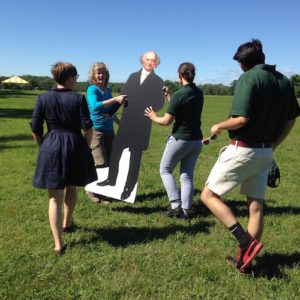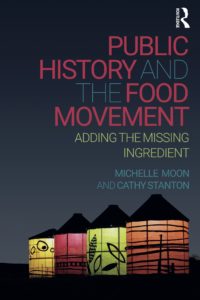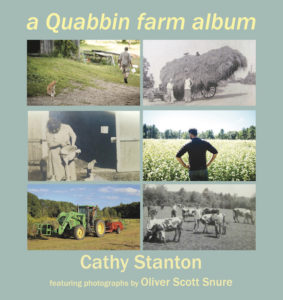Since 2010, I’ve been focusing my scholarly and public energies very largely around food and farming, including the uses of knowledge about the past of food and farming. This is a round-up of the main components of this work.
 Although I started thinking about the intersections of memory, history, food, and farming as soon as I finished my doctoral dissertation in 2004, I didn’t really get a chance to do any active work on those topics until 2010, when I had the opportunity to write an Ethnographic Landscape Study for Martin Van Buren National Historic Site in Kinderhook, New York. That study, called “Plant Yourself in My Neighborhood,” gave me a chance to do a really deep dive on the complexities of agriculture and the ways our social and historical knowledge about it often keeps us from understanding it more clearly. The study won a 2013 Excellence in Consulting Award from the National Council on Public History. (That’s Martin Van Buren in the photo, being escorted out to one of his farm fields in 2016 by a group from the National Park Service’s Olmsted Center for Landscape Preservation.)
Although I started thinking about the intersections of memory, history, food, and farming as soon as I finished my doctoral dissertation in 2004, I didn’t really get a chance to do any active work on those topics until 2010, when I had the opportunity to write an Ethnographic Landscape Study for Martin Van Buren National Historic Site in Kinderhook, New York. That study, called “Plant Yourself in My Neighborhood,” gave me a chance to do a really deep dive on the complexities of agriculture and the ways our social and historical knowledge about it often keeps us from understanding it more clearly. The study won a 2013 Excellence in Consulting Award from the National Council on Public History. (That’s Martin Van Buren in the photo, being escorted out to one of his farm fields in 2016 by a group from the National Park Service’s Olmsted Center for Landscape Preservation.)
 With Michelle Moon, I worked to set out a rationale and a roadmap for museums and other historical and cultural institutions that want to align their programming in some way with contemporary local food projects. Michelle and I linked up after a 2011 conference at Plimoth Plantation where I offered some plenary remarks setting out a challenge for historic sites to do more with the knowledge they were preserving. We’ve co-authored a piece for The Public Historian (“The First Course: A Case for Locating Public History within ‘The Food Movement“), led workshops at several conferences, and written a book for Routledge entitled Public History and the Food Movement: Adding the Missing Ingredient. Here’s the website for the book.
With Michelle Moon, I worked to set out a rationale and a roadmap for museums and other historical and cultural institutions that want to align their programming in some way with contemporary local food projects. Michelle and I linked up after a 2011 conference at Plimoth Plantation where I offered some plenary remarks setting out a challenge for historic sites to do more with the knowledge they were preserving. We’ve co-authored a piece for The Public Historian (“The First Course: A Case for Locating Public History within ‘The Food Movement“), led workshops at several conferences, and written a book for Routledge entitled Public History and the Food Movement: Adding the Missing Ingredient. Here’s the website for the book.
 In the North Quabbin region of Massachusetts, I partnered with Mount Grace Land Conservation Trust on a public humanities project called “Farm Values: Civic Agriculture at the Crossroads.” I produced micro-histories of six area farms and linked them with broader struggles to keep small-scale farming viable over two centuries of industrial capitalism. Farm Values has had an active afterlife, with an ongoing farmer portrait series by Oliver Scott Snure and a 2017 book published by Haley’s of Athol, A Quabbin Farm Album. Read about the book and the photos here.
In the North Quabbin region of Massachusetts, I partnered with Mount Grace Land Conservation Trust on a public humanities project called “Farm Values: Civic Agriculture at the Crossroads.” I produced micro-histories of six area farms and linked them with broader struggles to keep small-scale farming viable over two centuries of industrial capitalism. Farm Values has had an active afterlife, with an ongoing farmer portrait series by Oliver Scott Snure and a 2017 book published by Haley’s of Athol, A Quabbin Farm Album. Read about the book and the photos here.
At Tufts University, I’m the academic advisor for the minor in Food Systems and Nutrition, launched in 2016. In my food-related classes, I’ve collaborated with the Boston Public Market, Wright-Locke Farm in Winchester, and the Massachusetts Food System Collaborative for the Anthropology Department’s “Fieldwork Lab” course, a class in ethnographic methods. I’ve also been teaching the project-based “Practicing in Food Systems” class in the Environmental Studies program, which has conducted field research for the Somerville Food Security Coalition, Shape Up Somerville,Tufts Dining, and others.
And in real life I’ve been a very active volunteer at a small food coop in Orange, Massachusetts, which has taught me more than anything else about the sharp realities of the food economy. I started out blogging about that occasionally and have written a full-length book about it called Food Margins: Lessons from an Unlikely Grocer.
Some other food and farm related work I’ve done includes:
- “Foodshed as memoryscape: New England neo-agrarianism and the paradox of the working landscape” in Routledge Handbook of Memory and Place, Sarah De Nardi et al, eds. (Routledge, 2019)
- “Food History” entry in The Inclusive Historian’s Handbook, co-authored with Michelle Moon (2019)
- “Can History Help Us Reinvent the Food System?“, a talk I gave at Wright-Locke Farmin Winchester, MA in summer 2018
- A summer 2018 podcast interview for NOFA/Mass; I’ve also presented history-related sessions at NOFA/Mass’s Winter Conference
- “Farming in the Sweet Spot: Integrating Interpretation, Preservation, and Food Production at National Parks” in The George Wright Forum, Vol 34, No 3 (Dec 2017), pp 275-284.
- “Between Pastness and Presentism: Public History and the Local Food Movement,” a chapter in The Oxford Handbook of Public History (James Gardner and Paula Hamilton, eds, Oxford University Press, 2017) explores the divergence of working farms and historical knowledge about them.
- The History at the Table blog, which was active from 2011 to 2014 as a kind of sandbox for this new work.
- The Landcestor Project, another sandboxy site that I made as a home for data-gathering about farming history in the Quabbin area towns. I had an idea about making this an open-source venue that would show some of the work that goes into piecing together histories of farms and farmers, but I got cold feet about it because I wasn’t sure I wanted to show the world quite so much of my messy behind-the-scenes process. Maybe someday.